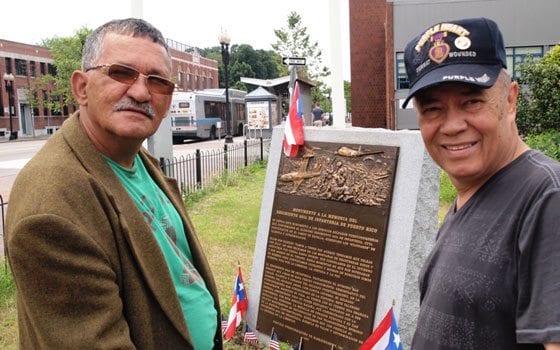
Twice a week, Tony Molina and Jaime Rodriguez visit the memorial to the Puerto Rican 65th Infantry Regiment that fought in the Korean War.
The bronze plaque, surrounded by Puerto Rican, American, Massachusetts and Prisoner of War/Missing in Action flags, is in a triangular plot of land at the corner of Washington and West Dedham streets in the South End. There, the men, both Vietnam War vets, straddle the steel fence and spend 15 to 20 minutes picking up bottles, plastic bags, candy wrappers and other rubbish.
It’s a small plot of land, but it has great significance to the men.
“Boston was the first city in the country to dedicate a memorial to Puerto Rican soldiers,” Rodriguez says.
While there are statues and monuments to Puerto Ricans who fought alongside U.S. troops in every conflict from the Spanish American War through Vietnam, there were none outside of the island until 1999, when the Puerto Rican veterans secured the plot, which sits across the street from the Cathedral of the Holy Cross.
As much pride as Molina and Rodriguez take in the memorial, they’ve already set their sights on a larger one. Molina rolls out an artist’s rendering of a 20-foot high Puerto Rican veterans memorial, featuring a bronze statue of a male and a female soldier atop a granite pedestal.
“Most people don’t know how much blood Puerto Ricans have given for this country,” Molina says. “Even before 1898, we have been fighting for this country.”
Puerto Rico, which was annexed as a colony by the U.S. in the 1898 Spanish American War, was first colonized by Spain in 1508. Puerto Rican colonists enlisted to fight alongside American colonists in the American Revolutionary War and fought in the Union Army in the Civil War.
Puerto Ricans also fought in both world wars. In Korea, 43,000 Puerto Ricans served in the 65th Regiment.
“Per capita, Puerto Ricans have lost more men in battle than any other ethnic group,” Molina notes. “In Vietnam, we lost more men than any state.”
Molina, who enlisted in the Marines in 1965, almost became one of those casualties, taking a sniper round in the head that same year. He was the first Puerto Rican wounded in the war.
A Bridgeport, Conn. native, he recuperated at the V.A. hospital in Boston and has stayed here since.
When Molina was discharged from the hospital in 1965, the Puerto Rican community was centered in the South End, where most African Americans in Boston lived as well.
The Cathedral of the Holy Cross was the first church to offer masses in Spanish for the Puerto Rican community. Shops owned by Puerto Ricans opened on Washington Street. The Cardinal Medeiros Center opened nearby and began running social service programs for Puerto Ricans.
In those days, there were few services for veterans.
Molina and Rodriguez, who served in the Army in 1968 and 1969, say Puerto Ricans had it tough.
“Every single Vietnam veteran had a drinking problem,” Molina says. “Unemployment was really high.”
Rodriguez said it was the efforts of African American Vietnam vets like Ralph Cooper, Ernest Washington, Ernest Branch and Ron Armstrong that helped get services for Vietnam vets in Boston.
“It was because of Ron Armstrong that I became involved in veterans issues,” he comments.
Rodriguez went on to serve as a special assistant to the Office of Veterans Services of Massachusetts and research director at the William Joiner Center for the Study of War and Social Consequences at UMass Boston.
Molina founded a radio station and newspaper that served the Puerto Rican community in Boston and also organized the Puerto Rican Festival. For both of them, the lack of recognition for Puerto Rican veterans remained a sore spot.
Molina and Rodriguez plan to raise $300,000 for the memorial, which will incorporate the existing plaque dedicated to the 65th Regiment.
“There has been a lot of discrimination against us,” Rodriguez says. “People don’t recognize us as a people who have been fighting for the freedom of this country. We want to leave a legacy so that 100 years from now, people will know we gave our lives for this country. We know there’s no other way people will know about us.”






